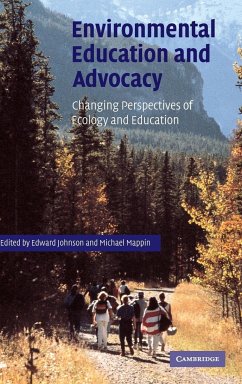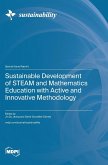Edward A. Johnson / Michael J. Mappin (eds.)
Environmental Education and Advocacy
Herausgeber: Johnson, Edward A.; Mappin, Michael J.
Edward A. Johnson / Michael J. Mappin (eds.)
Environmental Education and Advocacy
Herausgeber: Johnson, Edward A.; Mappin, Michael J.
- Gebundenes Buch
- Merkliste
- Auf die Merkliste
- Bewerten Bewerten
- Teilen
- Produkt teilen
- Produkterinnerung
- Produkterinnerung
Brings together ecologists, environmental philosophers and educators to address concerns over advocacy in environmental education.
Andere Kunden interessierten sich auch für
![Sustainable Development of STEAM and Mathematics Education with Active and Innovative Methodology Sustainable Development of STEAM and Mathematics Education with Active and Innovative Methodology]() Sustainable Development of STEAM and Mathematics Education with Active and Innovative Methodology93,99 €
Sustainable Development of STEAM and Mathematics Education with Active and Innovative Methodology93,99 €![STEAM Education and the Innovative Pedagogies in the Intelligence Era STEAM Education and the Innovative Pedagogies in the Intelligence Era]() STEAM Education and the Innovative Pedagogies in the Intelligence Era86,99 €
STEAM Education and the Innovative Pedagogies in the Intelligence Era86,99 €![Why Dissection? Animal Use in Education Why Dissection? Animal Use in Education]() Lynette HartWhy Dissection? Animal Use in Education66,99 €
Lynette HartWhy Dissection? Animal Use in Education66,99 €![Technologies in Biomedical and Life Sciences Education Technologies in Biomedical and Life Sciences Education]() Technologies in Biomedical and Life Sciences Education185,99 €
Technologies in Biomedical and Life Sciences Education185,99 €![Technologies in Biomedical and Life Sciences Education Technologies in Biomedical and Life Sciences Education]() Technologies in Biomedical and Life Sciences Education185,99 €
Technologies in Biomedical and Life Sciences Education185,99 €![What Makes Biology Unique? What Makes Biology Unique?]() Ernst MayrWhat Makes Biology Unique?79,99 €
Ernst MayrWhat Makes Biology Unique?79,99 €![Water Science Reviews 3 Water Science Reviews 3]() Felix FranksWater Science Reviews 3206,99 €
Felix FranksWater Science Reviews 3206,99 €-
-
-
Brings together ecologists, environmental philosophers and educators to address concerns over advocacy in environmental education.
Hinweis: Dieser Artikel kann nur an eine deutsche Lieferadresse ausgeliefert werden.
Hinweis: Dieser Artikel kann nur an eine deutsche Lieferadresse ausgeliefert werden.
Produktdetails
- Produktdetails
- Verlag: Cambridge University Press
- Seitenzahl: 346
- Erscheinungstermin: 12. Januar 2016
- Englisch
- Abmessung: 235mm x 157mm x 25mm
- Gewicht: 713g
- ISBN-13: 9780521824101
- ISBN-10: 0521824109
- Artikelnr.: 21328526
- Herstellerkennzeichnung
- Libri GmbH
- Europaallee 1
- 36244 Bad Hersfeld
- gpsr@libri.de
- Verlag: Cambridge University Press
- Seitenzahl: 346
- Erscheinungstermin: 12. Januar 2016
- Englisch
- Abmessung: 235mm x 157mm x 25mm
- Gewicht: 713g
- ISBN-13: 9780521824101
- ISBN-10: 0521824109
- Artikelnr.: 21328526
- Herstellerkennzeichnung
- Libri GmbH
- Europaallee 1
- 36244 Bad Hersfeld
- gpsr@libri.de
Edward Johnson is Professor of Ecology and the Director of the Kananaskis Field Stations at the University of Calgary.
Michael Mappin is the Coordinator of School and Community Programs at the Kananaskis Field Stations, University of Calgary.
Michael Mappin is the Coordinator of School and Community Programs at the Kananaskis Field Stations, University of Calgary.
Contributors; Preface; 1. Changing perspectives of ecology and education in
environmental education M. J. Mappin and E. A. Johnson; Part I. Changing
Perspectives of Ecology: 2. Scientific ecology and ecological ethics: the
challenges of drawing ethical conclusions from scientific facts J. R. Des
Jardins; 3. Changing academic perspectives of ecology: a view from within
J. Kolasa and S. T. A. Pickett; 4. The role of learned societies,
government agencies, NGOs, advocacy groups, schools, and environmental
educators in shaping public understanding of ecology D. R. Slingsby and S.
Barker; Part II. Changing Perspectives of Education: 5. Education and
advocacy: a troubling relationship B. Jickling; 6. Changing academic
perspectives in environmental education research and practice: progress and
promise J. A. Palmer and J. C. Birch; 7. The purposes of environmental
education: perspectives of teachers, governmental agencies, NGOs,
professional societies and advocacy groups J. F. Disinger; Part III.
Assessing Changing Perspectives in Ecology and Education: 8. Developing
guidelines for environmental education in the United States: the national
project for excellence in environmental education B. Simmons; 9. Assessing
the educational dimension of environmental education resources provided by
non-formal groups D. L. Haury; 10. Assessing the science dimension of
environmental issues through environmental education S. D. Kolsto; Part IV.
Integrating Changing Perspectives of Ecology, Education and Action: 11. A
framework for integrating ecological literacy, civics literacy and
environmental citizenship in environmental education M. E. Krasny and R.
Bonney; 12. Integrating education and action in environmental education M.
McClaren and B. Hammond; 13. Environmental education through citizen
science and participatory action research M. E. Krasny and R. Bonney;
Index.
environmental education M. J. Mappin and E. A. Johnson; Part I. Changing
Perspectives of Ecology: 2. Scientific ecology and ecological ethics: the
challenges of drawing ethical conclusions from scientific facts J. R. Des
Jardins; 3. Changing academic perspectives of ecology: a view from within
J. Kolasa and S. T. A. Pickett; 4. The role of learned societies,
government agencies, NGOs, advocacy groups, schools, and environmental
educators in shaping public understanding of ecology D. R. Slingsby and S.
Barker; Part II. Changing Perspectives of Education: 5. Education and
advocacy: a troubling relationship B. Jickling; 6. Changing academic
perspectives in environmental education research and practice: progress and
promise J. A. Palmer and J. C. Birch; 7. The purposes of environmental
education: perspectives of teachers, governmental agencies, NGOs,
professional societies and advocacy groups J. F. Disinger; Part III.
Assessing Changing Perspectives in Ecology and Education: 8. Developing
guidelines for environmental education in the United States: the national
project for excellence in environmental education B. Simmons; 9. Assessing
the educational dimension of environmental education resources provided by
non-formal groups D. L. Haury; 10. Assessing the science dimension of
environmental issues through environmental education S. D. Kolsto; Part IV.
Integrating Changing Perspectives of Ecology, Education and Action: 11. A
framework for integrating ecological literacy, civics literacy and
environmental citizenship in environmental education M. E. Krasny and R.
Bonney; 12. Integrating education and action in environmental education M.
McClaren and B. Hammond; 13. Environmental education through citizen
science and participatory action research M. E. Krasny and R. Bonney;
Index.
Contributors; Preface; 1. Changing perspectives of ecology and education in
environmental education M. J. Mappin and E. A. Johnson; Part I. Changing
Perspectives of Ecology: 2. Scientific ecology and ecological ethics: the
challenges of drawing ethical conclusions from scientific facts J. R. Des
Jardins; 3. Changing academic perspectives of ecology: a view from within
J. Kolasa and S. T. A. Pickett; 4. The role of learned societies,
government agencies, NGOs, advocacy groups, schools, and environmental
educators in shaping public understanding of ecology D. R. Slingsby and S.
Barker; Part II. Changing Perspectives of Education: 5. Education and
advocacy: a troubling relationship B. Jickling; 6. Changing academic
perspectives in environmental education research and practice: progress and
promise J. A. Palmer and J. C. Birch; 7. The purposes of environmental
education: perspectives of teachers, governmental agencies, NGOs,
professional societies and advocacy groups J. F. Disinger; Part III.
Assessing Changing Perspectives in Ecology and Education: 8. Developing
guidelines for environmental education in the United States: the national
project for excellence in environmental education B. Simmons; 9. Assessing
the educational dimension of environmental education resources provided by
non-formal groups D. L. Haury; 10. Assessing the science dimension of
environmental issues through environmental education S. D. Kolsto; Part IV.
Integrating Changing Perspectives of Ecology, Education and Action: 11. A
framework for integrating ecological literacy, civics literacy and
environmental citizenship in environmental education M. E. Krasny and R.
Bonney; 12. Integrating education and action in environmental education M.
McClaren and B. Hammond; 13. Environmental education through citizen
science and participatory action research M. E. Krasny and R. Bonney;
Index.
environmental education M. J. Mappin and E. A. Johnson; Part I. Changing
Perspectives of Ecology: 2. Scientific ecology and ecological ethics: the
challenges of drawing ethical conclusions from scientific facts J. R. Des
Jardins; 3. Changing academic perspectives of ecology: a view from within
J. Kolasa and S. T. A. Pickett; 4. The role of learned societies,
government agencies, NGOs, advocacy groups, schools, and environmental
educators in shaping public understanding of ecology D. R. Slingsby and S.
Barker; Part II. Changing Perspectives of Education: 5. Education and
advocacy: a troubling relationship B. Jickling; 6. Changing academic
perspectives in environmental education research and practice: progress and
promise J. A. Palmer and J. C. Birch; 7. The purposes of environmental
education: perspectives of teachers, governmental agencies, NGOs,
professional societies and advocacy groups J. F. Disinger; Part III.
Assessing Changing Perspectives in Ecology and Education: 8. Developing
guidelines for environmental education in the United States: the national
project for excellence in environmental education B. Simmons; 9. Assessing
the educational dimension of environmental education resources provided by
non-formal groups D. L. Haury; 10. Assessing the science dimension of
environmental issues through environmental education S. D. Kolsto; Part IV.
Integrating Changing Perspectives of Ecology, Education and Action: 11. A
framework for integrating ecological literacy, civics literacy and
environmental citizenship in environmental education M. E. Krasny and R.
Bonney; 12. Integrating education and action in environmental education M.
McClaren and B. Hammond; 13. Environmental education through citizen
science and participatory action research M. E. Krasny and R. Bonney;
Index.








